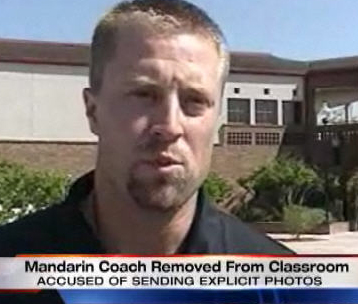Thou Shalt Not Send Naked Pictures…To Anyone Ever
 It’s becoming a familiar story, an angry parent of a student reports finding inappropriate images, self taken naked pictures and videos, on that student’s cell phone. The images and video were sent to the student by a high school football coach. The mother of the student e-mailed the pictures to the administration of the high school, and the coach was promptly fired in disgrace. But this story has an unusual wrinkle: the student is a 20 year-old at the University of Central Florida, the girlfriend of 32 year-old Mandarin High School football coach Jason Robinson.
It’s becoming a familiar story, an angry parent of a student reports finding inappropriate images, self taken naked pictures and videos, on that student’s cell phone. The images and video were sent to the student by a high school football coach. The mother of the student e-mailed the pictures to the administration of the high school, and the coach was promptly fired in disgrace. But this story has an unusual wrinkle: the student is a 20 year-old at the University of Central Florida, the girlfriend of 32 year-old Mandarin High School football coach Jason Robinson.
Upon finding the pictures, the mother of Jason Robinson’s college age girlfriend fired the images off to the administration at the High School employing this coach. The administration reacted by terminating Robinson, who being within the first three years of his contract there was essentially the equivalent of an “at-will” employee.
The high school principal, Dr. Donna Richardson, fired off the following letter to the coach:
“Effective today you have been reassigned to Bulls Bay for the remainder of this school year. You are not to come back onto our campus, and we will make arrangements to get any of your personal belongings to you.
You are also being non-reappointed for the next school year. It is regretful it had to come to this, but I believe you understand the situation.”
“We hold our teachers to a higher standard. They are in front of our students. They’re talking with our students. They’re teaching our students how to become good characters”
Jason Robinson
So we are left with an ‘at will’ employee, who can be dismissed for any reason, being dismissed for showing a lack of sound judgment and a potential violation of a policy (which for whatever reason couldn’t be located in time to include in the letter). From a legal standpoint, the dismissal may be on solid enough ground.
The incident is problematic on a number of fronts though. As soon as an employing organization begins to pass judgment on the private, non-criminal, non-disallowed by policy, actions of two consenting adults, they open themselves up in an inappropriate role as a moral arbiter over their teachers and staff. The mother’s actions were largely inappropriate in the absence of a crime or high school policy violation regarding relationships between teachers and staff. There has been no indication yet that this relationship started when the girlfriend was a high school student herself. But since you can’t control parents, the high school board, a group of people, owed it to all involved to display a cooler head.
Robinson is claiming this incident has ruined his reputation, and is suing the parents of his 20 year old girlfriend for violating his privacy by looking at the material. It certainly does affect his future prospects in working as a high school football coach to be so publicly dismissed.
A sister of the girlfriend does attend high school at Mandarin also, probably another reason this should have been handled much more quietly, as her life must be a joy right now.
One Wrinkle Though
There is one awkward little wrinkle to the whole episode which may make the school board right (but which throws into question why they wouldn’t comment further to defend their position). There is an allegation that the coach used a school computer to send the images. If that is the case, a policy prohibiting using school equipment to view or send pornography should both be in place and apply (minus the publicity and ‘shaming’ e-mail).
So why isn’t that being included in the school’s response to the case? Either because it isn’t true, or because they haven’t conducted a responsible forensics investigation to back up the allegation. To fire someone so publicly without having this was a mistake. Administrative leave, strengthening the case via proper computer forensics, and then having a full story to go forward with is the correct way to go, not an e-mail sent in haste from the principle’s computer.
According to most followup commentary, the “sent from a school computer” piece likely is not true anyway.
Sexting
Basically the act of sending a sexually explicit photograph or message with mobile phones as the communication device. The name derives from a combination (or portmanteau for those who want to learn a new word) of the words sex and texting.
The first well known reference to the word is a 2005 article in the British Sunday Telegraph Magazine. In a survey conducted by Cosmogirl, 20% of teens and 33% of young adults indicated they had sent nude or semi-nude (big difference) pictures of themselves via electronic communications. Some 39% of teens and 59% of young adults had said they sent sexually explicit messages.
The Cosmogirl results have been thrown into question however (surveys always are); at least one sociologist, C.J. Pascoe, an assistant professor at Colorado College, completed a three year study interviewing 80 teenagers and found no evidence of truly explicit text or photographs sent via mobile devices.
From personal experience, students are certainly sending and posting information that their parents and other adults would note is probably a mistake to preserve electronically and share. Campaigns, such as the James Lipton campaign we posted about earlier, Don’t Tweet Your Junk, are largely a reaction to this problem.
So there is an issue here that should not be ignored, one that naturally followed the increasing capabilities of cell phones, the decreasing costs, and the result that more young people than ever have sophisticated access to communications technology (something their parents did not by and large have). That said, hyping the numbers by suggesting that 2 out of every 10 teens are sending naked pictures of themselves via their phones is unnecessarily alarmist.
The other larger problem of overreaction is overzealous prosecution of teenagers under child pornography laws which were certainly not codified to cover teenagers e-mailing photographs to each other. Further, the classification of said teenagers or young adults as sex offenders serves only to weaken the notification requirements under Meghan’s Law, designed to protect youth against real sex predators.
Finally
I don’t understand the proclivity in the number of people sending naked pictures of their junk to other people. Maybe if doing so will result in Paris Hilton like publicity, but for most of us photographing our nether regions should be grounds for having our heads examined. That said, what we have here is two consenting adults sending content between each other. It was no more the high school’s business than it was that of the mother, unless a school computer was used.
One could make the loose case that the Mother of a 20 year-old might have the moral authority to snoop to try to keep her daughter safe (we don’t really think so at 20, but we could see someone saying that). But sending the pictures on to the high school administration rather than handing this as a private family member shows terrible judgment on the mother’s part. But parents can’t be controlled, the school had to realize a story as salacious as this would spawn media coverage, and should have had their act in order before reacting. If they have nothing, no evidence that this relationship started when the girl was underage or in high school, no use of a school computer via evidence gathered in a forensically sound manner, then this school board has made a mistake.
Or as Principal Richardson defined the school’s mission: “They’re teaching our students how to become good characters”. They’re acting like characters all right, so far anyway.
Sources:

